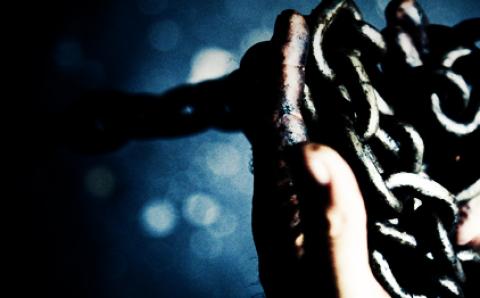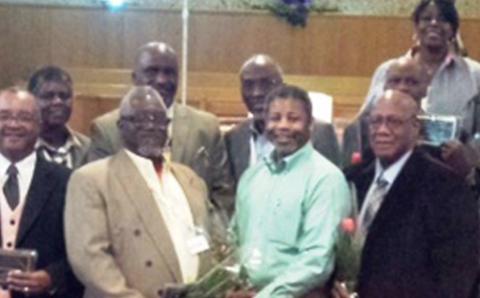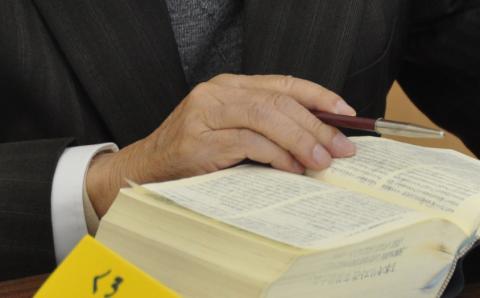Speaking our minds has become a dangerous business in today’s world. Perk up your ears to the alarmingly common sirens from the world’s great capitals, Paris being only the most recent, and you’ll see that “freedom of speech” is in a fight to the death with blasphemy and apostasy laws— with what international jurists call “the defamation of religion.”
The problem is as dangerous as it is vexing. What is a Christian to make of the offensive and baldly inflammatory images of the prophet Mohammed, of the outrageous cartoons that have set so much of the Islamic world on edge? Shouldn’t Christians be more responsible than this, turning to more practical and productive interfaith work whose calling card does not include dragging cherished icons through the mud?
The Responsibility of Governments and of the Church
Let’s take this in two pieces: first, what is the responsibility of governments, of justice, in the face of blasphemy and apostasy charges; second, what is the responsibility of Christians and of the church to these same issues? These are, for reasons of history and theology, not the same thing.
The Christian Reformed Church has startlingly clear teaching on blasphemy and justice, partly because we shifted directions on this issue quite dramatically just after World War II. We did this by changing one of our oldest confessional standards, the Belgic Confession.
The Belgic Confession is rooted in the problem of blasphemy and apostasy. Its author, Guido de Brès, who died as a martyr in 1567, went to great lengths to prove to his Catholic persecutors that the Reformed faithful were not rebels; in fact, they stood ready to obey the government in all lawful matters. But, sounding like they could be living in a Syrian border town in the 21st century, the signers of the confession said they would “offer their backs to stripes, their tongues to knives, their mouths to gags, and their whole bodies to the fire” rather than deny the truths of the confession.
That multiple confessional identities can somehow persist amidst a single political identity was not obvious to medieval Europe. Even the Belgic itself is a bit cagey on just how far we can take this confessional potpourri. Article 36 (in the original language) admonishes government to uphold sacred ministry and to remove and destroy all idolatry and false worship of the Antichrist, while further promoting the kingdom of Jesus Christ.
Which is why in 1958 the CRCNA did a full 180 on Article 36, judging its original content “unbiblical.” The substituted Article, while calling on government to restrain human lawlessness, punish the evildoer, and protect the good, confirms government’s task of “removing every obstacle to the preaching of the gospel and to every aspect of divine worship.” This should be done, further, “while completely refraining from every tendency toward exercising absolute authority,” so that “the Word of God may have free course.”
So before Article 36 changed, it was the government’s responsibility to restrict blasphemy and apostasy, and to promote, in its own language, the kingdom of Jesus Christ. Now? There is still a general recognition that governments have a responsibility to govern and restrict things like “hate speech” or speech producing “clear and present danger”—classically, falsely shouting “fire” in a crowded theater. But it is generally now recognized that a pluralist state cannot restrict free speech simply because someone might be offended. The freedom to give offense is intrinsic to a whole package of other freedoms, including freedom of religion or belief, freedom of speech, of the press, of association, and so forth.
The Offense of the Gospel
These fundamental freedoms of a just society also safeguard the proclamation of the gospel and the witness of Christians. In these times where “niceness” can be the measuring rod by which people will “know we are Christians,” we sometimes forget that the Word of God describes itself as an offensive message. There is nothing especially lovely about being told we are damned sinners; that this damnation is so utter, so cosmic, that we are wholly unable, of our own power, to find reconciliation with God, with each other, and with creation. The wrath and judgment of Good Friday are brutal, powerful facts that must stand, by any accounting, as offensive.
Evangelically, this might not be the best lead-in to faith conversations over coffee. But the point is to say that the Christian gospel is an offensive message, and plenty of countries around the world―including Saudi Arabia, Iran, North Korea, and Afghanistan—have lined up to agree. In these countries, preaching salvation and reconciliation in the name of Jesus Christ is a crime, as is conversion from Islam to Christianity, punishable in some cases by death or exile, all under the title of “blasphemy and apostasy.”
Freedomand Responsibility, Truth and Love
But the truth, we say, is full of love. Or, in another old favorite attributed to St. Francis of Assisi: “Preach the gospel; if necessary, use words.” Good deeds violate no blasphemy laws, so why should we? The apostle Paul says something similar in Galatians after naming fruits of the Spirit, that “against such things there is no law” (Gal. 5:23). So shouldn’t Christian responsibility avoid, at all costs, offending or blaspheming other traditions and faiths? Shouldn’t a responsible witness be a witness characterized by action, not brash sermonizing?
In my opinion, no. Insofar as it is possible, I believe it is responsible for Christians to avoid giving offense, but this is at best a secondary, not a primary, consideration. Offending, even the act of blasphemy, is intrinsic in any candid expression of the gospel of Jesus Christ. This is a kind of “blasphemy” that deserves passionate Christian support.
It has passed so beyond the public consciousness in North America that it is nearly banal to mention that Christians here have their most sacred beliefs blasphemed with casual regularity (perhaps most famously in “Piss Christ,” a depiction of the crucifix submerged in a glass of the artist’s urine).
It seems to me that Christians should object to this sort of thing—not with lawyers and litigants, since a Reformed Christian perspective on justice includes the right to offend in a pluralist society—but with social witness and debate. The “substitutionary argument” can often be especially effective: substitute the offending Christian image/idea with a Muslim or Jewish one, and does it suddenly violate the rules of decorous public debate? Beyond that, it is a prize of Christian theology that we need not suffer any special anxiety when the true God is mocked. The God who makes and unmakes a cosmos stretching far beyond our meager imaginations will sovereignly have his own justice. There are no stockades in the good society for blasphemers, either of Christian or other faiths.
So what about those prophet cartoons, or the plight of those like Satanic Verses author Salman Rushdie, trying to name frankly, if satirically, social and religious repression? If you follow the argument, you’ll read a Christian defense of the justice that includes the freedom to offend and blaspheme in a pluralist society.
But you’ll also read a genuine effort to argue that the Christian exercise of that freedom should be responsible. It is truth, but it is filled with love. That’s not always inoffensive; in fact, it may necessarily be offensive, but it should always bring the light and life of Jesus Christ. That is the essence of Christian responsibility in a blasphemous world.
About the Author
Robert Joustra is a member of First CRC, Hamilton, Ontario. He is assistant professor of international studies at Redeemer University College, a fellow with The Review of Faith and International Affairs, and a fellow at the Center for Public Justice.









